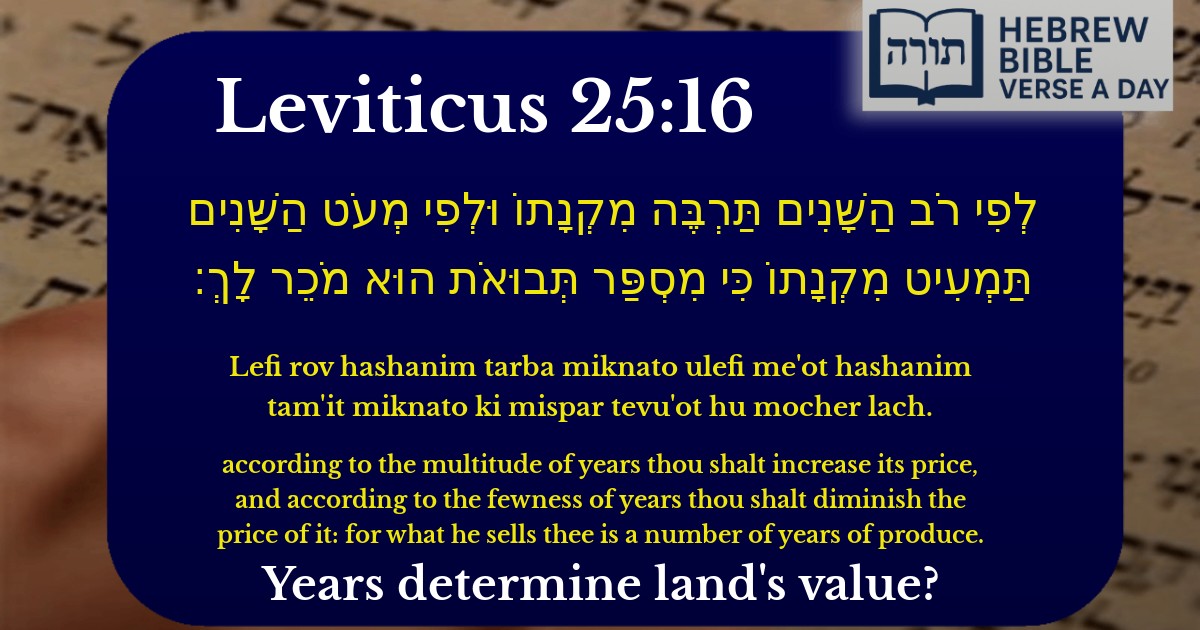Join Our Newsletter To Be Informed When New Videos Are Posted
Join the thousands of fellow Studends who rely on our videos to learn how to read the bible in Hebrew for free!
Hebrew Text
לְפִי רֹב הַשָּׁנִים תַּרְבֶּה מִקְנָתוֹ וּלְפִי מְעֹט הַשָּׁנִים תַּמְעִיט מִקְנָתוֹ כִּי מִסְפַּר תְּבוּאֹת הוּא מֹכֵר לָךְ׃
English Translation
according to the multitude of years thou shalt increase its price, and according to the fewness of years thou shalt diminish the price of it: for what he sells thee is a number of years of produce.
Transliteration
Lefi rov hashanim tarba miknato ulefi me'ot hashanim tam'it miknato ki mispar tevu'ot hu mocher lach.
Hebrew Leining Text
לְפִ֣י <b>׀</b> רֹ֣ב הַשָּׁנִ֗ים תַּרְבֶּה֙ מִקְנָת֔וֹ וּלְפִי֙ מְעֹ֣ט הַשָּׁנִ֔ים תַּמְעִ֖יט מִקְנָת֑וֹ כִּ֚י מִסְפַּ֣ר תְּבוּאֹ֔ת ה֥וּא מֹכֵ֖ר לָֽךְ׃
לְפִ֣י ׀ רֹ֣ב הַשָּׁנִ֗ים תַּרְבֶּה֙ מִקְנָת֔וֹ וּלְפִי֙ מְעֹ֣ט הַשָּׁנִ֔ים תַּמְעִ֖יט מִקְנָת֑וֹ כִּ֚י מִסְפַּ֣ר תְּבוּאֹ֔ת ה֥וּא מֹכֵ֖ר לָֽךְ׃
🎵 Listen to leining
Parasha Commentary
📚 Talmud Citations
This verse is not quoted in the Talmud.


Context in the Torah
The verse (Vayikra 25:16) appears in the context of the laws of shemittah (the Sabbatical year) and yovel (the Jubilee year), specifically addressing the proper valuation of land sales in relation to these cycles. The Torah establishes that land in Eretz Yisrael cannot be sold permanently, as it belongs to Hashem (Vayikra 25:23). Instead, transactions are effectively leases for the number of years remaining until the next yovel.
Explanation of the Verse
Rashi explains that this verse teaches the proper calculation for purchasing land based on its remaining years of productivity before the yovel. If many years remain until yovel, the price increases because the buyer will benefit from more harvests. Conversely, if few years remain, the price decreases since the buyer will have fewer harvests before the land returns to its original owner. The phrase "כִּי מִסְפַּר תְּבוּאֹת הוּא מֹכֵר לָךְ" ("for what he sells thee is a number of years of produce") emphasizes that the transaction is not for the land itself but for the right to its produce for a limited time.
Halachic Implications
Moral and Philosophical Insights
The Kli Yakar (R' Shlomo Ephraim of Luntschitz) highlights that this law reinforces the idea that material possessions are temporary. Even land, which seems like a permanent asset, is subject to divine cycles, teaching humility and trust in Hashem's providence. The Sforno adds that this system prevents greed and ensures economic justice, as no one can monopolize land indefinitely.
Midrashic Interpretation
The Torat Kohanim (Sifra, Behar 4:4) connects this verse to the broader theme of hashgachah pratit (divine supervision). Just as the value of land fluctuates based on divine cycles, so too should a person recognize that all sustenance comes from Hashem, not merely from human effort in working the land.